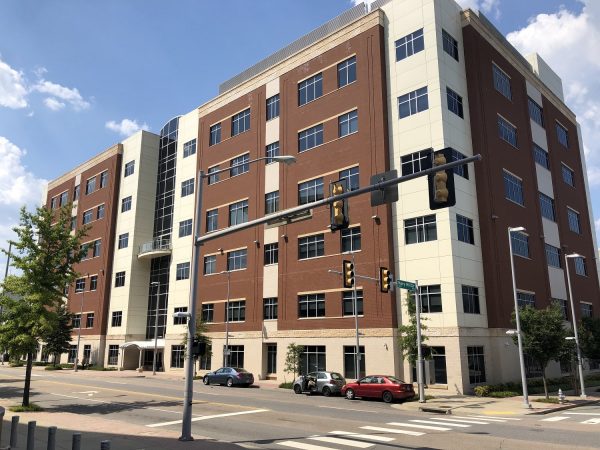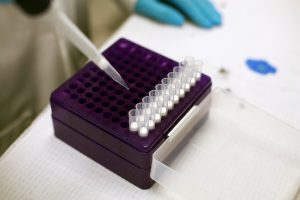
True Health’s facility at 737 N Fifth St., which was built by the now-collapsed Health Diagnostic Laboratory. (Michael Schwartz)
In 2015, Texas-based True Health Diagnostics took a leap to buy the assets of toppled Richmond blood testing firm Health Diagnostic Laboratory out of bankruptcy for $37 million.
That deal included inheriting hundreds of employees in HDL’s sprawling lab in downtown Richmond. It instantly quadrupled the size of True Health, which at the time was a hungry, year-old company.
Now four years later, with True Health having fallen into bankruptcy this summer, the company is unloading the bulk of its assets – including some of what it bought from HDL – to a competitor for $8.5 million.
A bankruptcy court judge in Delaware last week approved the sale of much of True Health parent company THG Holdings to Cleveland Heartlab, a subsidiary of medical lab giant Quest Diagnostics.
Set to close Oct. 1, the sale appears to leave in limbo True Health’s 100,000-square-foot operation in the former HDL lab at 737 N. Fifth St., which True Health has been leasing since the 2015 deal.
Court documents show Cleveland Heartlab does not intend to assume True Health’s lease on the space. It’s also unclear what the sale may mean for the remaining True Health employees. The company had around 300 workers when it filed for bankruptcy in July, the bulk of which worked in Richmond and dozens of which were laid off at the time of the Chapter 11 filing.
A Quest spokesperson said in an email Wednesday: “We are not acquiring (True Health’s) facilities or staff, nor will we adopt its policies and business practices.”
Cleveland Heartlab does, however, intend to purchase much of the lab’s equipment, court documents show.
True Health’s chief restructuring officer Cliff Zucker, who was brought on to handle the bankruptcy, could not be reached Tuesday.
The building, known as Biotech 8, is owned by Ventas, a Chicago-based publicly traded REIT. Ventas bought the 262,000-square-foot structure in 2017 for $92 million.
While the building was constructed as HDL’s headquarters and had been partly owned by HDL, True Health never occupied the entire structure and its landlords eventually added VCU as a sizable co-tenant.
Medicare woes
True Health filed for bankruptcy protection in late July, after it said it was cut off for the second time in two years from Medicare reimbursements due to fraud allegations and overpayment of tens of millions of dollars. Medicare paybacks accounted for about 30 percent of True Health’s business and the company said it had missed out on $21 million in reimbursements in the last two years, while being saddled with $174 million in debt.
It listed in its initial Chapter 11 filing between $100 million and $500 million owed to untold hundreds of creditors. It listed assets of $10 million to $50 million.
It has continued to fight the federal government over those reimbursements and had lined up interim financing to maintain its operations and employees while a sale or restructuring could occur.
It ultimately opted for a sale, with Cleveland Heartlab emerging as the winning suitor after the offer deadline on Sept. 13.
Meanwhile, in Richmond federal court, HDL’s long-running bankruptcy case continues on more than four years after it began.
Attorney Richard Kanowitz of the Cooley law firm, who represents both the unsecured creditors committee in the True Health case and the trustee in HDL’s ongoing bankruptcy case, said the next notable step in HDL’s case is a trial scheduled for February 2020, in which the trustee is suing former HDL insiders. They include family members of one of HDL’s original investors, Tipton Golias, as well as entities tied to Floyd Calhoun Dent, who ran the third-party sales company that peddled HDL’s blood tests.

True Health’s facility at 737 N Fifth St., which was built by the now-collapsed Health Diagnostic Laboratory. (Michael Schwartz)
In 2015, Texas-based True Health Diagnostics took a leap to buy the assets of toppled Richmond blood testing firm Health Diagnostic Laboratory out of bankruptcy for $37 million.
That deal included inheriting hundreds of employees in HDL’s sprawling lab in downtown Richmond. It instantly quadrupled the size of True Health, which at the time was a hungry, year-old company.
Now four years later, with True Health having fallen into bankruptcy this summer, the company is unloading the bulk of its assets – including some of what it bought from HDL – to a competitor for $8.5 million.
A bankruptcy court judge in Delaware last week approved the sale of much of True Health parent company THG Holdings to Cleveland Heartlab, a subsidiary of medical lab giant Quest Diagnostics.
Set to close Oct. 1, the sale appears to leave in limbo True Health’s 100,000-square-foot operation in the former HDL lab at 737 N. Fifth St., which True Health has been leasing since the 2015 deal.
Court documents show Cleveland Heartlab does not intend to assume True Health’s lease on the space. It’s also unclear what the sale may mean for the remaining True Health employees. The company had around 300 workers when it filed for bankruptcy in July, the bulk of which worked in Richmond and dozens of which were laid off at the time of the Chapter 11 filing.
A Quest spokesperson said in an email Wednesday: “We are not acquiring (True Health’s) facilities or staff, nor will we adopt its policies and business practices.”
Cleveland Heartlab does, however, intend to purchase much of the lab’s equipment, court documents show.
True Health’s chief restructuring officer Cliff Zucker, who was brought on to handle the bankruptcy, could not be reached Tuesday.
The building, known as Biotech 8, is owned by Ventas, a Chicago-based publicly traded REIT. Ventas bought the 262,000-square-foot structure in 2017 for $92 million.
While the building was constructed as HDL’s headquarters and had been partly owned by HDL, True Health never occupied the entire structure and its landlords eventually added VCU as a sizable co-tenant.
Medicare woes
True Health filed for bankruptcy protection in late July, after it said it was cut off for the second time in two years from Medicare reimbursements due to fraud allegations and overpayment of tens of millions of dollars. Medicare paybacks accounted for about 30 percent of True Health’s business and the company said it had missed out on $21 million in reimbursements in the last two years, while being saddled with $174 million in debt.
It listed in its initial Chapter 11 filing between $100 million and $500 million owed to untold hundreds of creditors. It listed assets of $10 million to $50 million.
It has continued to fight the federal government over those reimbursements and had lined up interim financing to maintain its operations and employees while a sale or restructuring could occur.
It ultimately opted for a sale, with Cleveland Heartlab emerging as the winning suitor after the offer deadline on Sept. 13.
Meanwhile, in Richmond federal court, HDL’s long-running bankruptcy case continues on more than four years after it began.
Attorney Richard Kanowitz of the Cooley law firm, who represents both the unsecured creditors committee in the True Health case and the trustee in HDL’s ongoing bankruptcy case, said the next notable step in HDL’s case is a trial scheduled for February 2020, in which the trustee is suing former HDL insiders. They include family members of one of HDL’s original investors, Tipton Golias, as well as entities tied to Floyd Calhoun Dent, who ran the third-party sales company that peddled HDL’s blood tests.




Future seems pretty clear to me; no operations in Richmond and an empty 100,000 sq ft of space. Funny how the article last week talked about the new building being built by the new “dormant” Coliseum. Well you can add next to the vacant, bankrupt lab building. With the state about to move out its labs in 3-4 years, I am still not sure why Biotech and is agent are building more buildings?